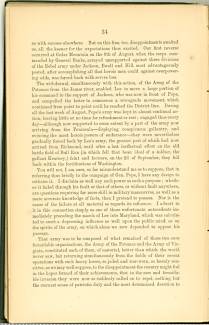Collection Name
About
us with success elsewhere. But on this line, too, disappointments awaited us, all the keener for the expectations thus excited. Our first reverse occurred at Cedar Mountain on the 9th of August, when the corps commanded by General Banks, arrayed unsupported against three divisions of the Rebel army under Jackson, Ewell and Hill, most advantageously posted, after accomplishing all that heroic men could against overpowering odds, was forced back with severe loss.
The withdrawal, simultaneously with this action, of the Army of the Potomac from the James river, enabled Lee to move a large portion of his command to the support of Jackson, who was now in front of Pope, and compelled the latter to commence a retrograde movement, which continued from point to point until he reached the District line. During all the last week of August, Pope's army was kept in almost continual action, leaving little or no time for refreshment or rest; engaged thus every day—although now supported to some extent by a part of the army now arriving from the Peninsula—displaying conspicuous gallantry, and evincing the most heroic powers of endurance—they were nevertheless gradually forced back by Lee's army, the greater part of which had now arrived from Richmond, until after a last ineffectual effort on the old battle field of Bull Run (in which fell that beau ideal of a soldier, the gallant Kearney,) faint and footsore, on the 2d of September, they fell back within the fortifications of Washington.
You will not, I am sure, so far misunderstand me as to suppose, that in referring thus briefly to the campaign of Gen. Pope, I have any design to criticise it. I disclaim as well any such power as such a purpose ; whether it failed through his fault or that of others, or without fault anywhere, are questions requiring far more skill in military manoeuvres, as well as a more accurate knowledge of facts, than I pretend to possess. Nor is the cause of the failure at all material as regards its influence. I advert to it in this connection simply as one of those unfortunate antecedents immediately preceding the march of Lee into Maryland, which was calculated to exert a depressing influence as well upon the public mind as on the spirits of the army, on which alone we now depended to oppose his passage.
That army was to be composed of what remained of those two once formidable organizations, the Army of the Potomac and the Army of Virginia, constituted each of them, of material, better than which the world never saw, but returning simultaneously from the fields of their recent operations with such heavy losses, so jaded and war-worn, so keenly sensitive, as we may well suppose, to the disappointment the country might feel in the hopes formed of their achievements, that in the new and formidable invasion they were now so suddenly called on to repel, nothing but the sternest sense of patriotic duty and the most determined devotion to
